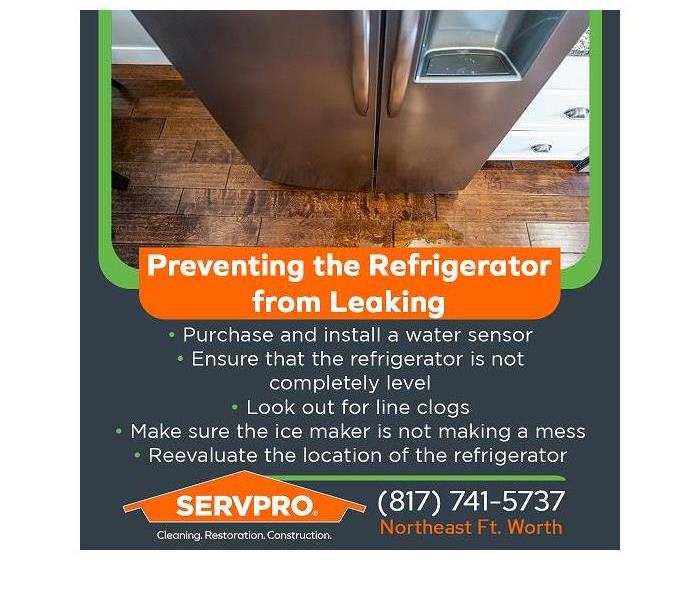Refrigerator Maintenance Tips to Keep the Appliance Operating Properly and to Prevent Water Damage
6/17/2022 (Permalink)
Blog Summary: SERVPRO of Northeast Fort Worth shares maintenance tips to help homeowners take care of their refrigerators and minimize the potential for water leaks and water damage.
Regular maintenance of the refrigerator helps the unit to operate correctly and efficiently and is a sound strategy to prevent water damage in the kitchen. The kitchen fridge stays hard at work round the clock, but for the most part, the appliance goes unnoticed. However, refrigerators need some TLC to keep them from flooding the kitchen floor with water.
Monthly Maintenance
Monthly maintenance matters for the ice maker. Each month, empty the ice bin and remove any built-up chunks of ice. The ice will pick up the foul odors and smells in the freezer. Deploy an open box of baking soda to absorb these smells.
Quarterly Maintenance
Clean the door gasket with the changing of each season to ensure the seal is tight when the door is closed. A loose seal wastes energy and stresses the appliance. Clean grimy gaskets with soapy water, and let them dry completely. If seals are loose, their embedded magnets can be either replaced or re-magnetized.
Remove dust, grime, and pet hair from the condenser coils and fan with the vacuum and a brush attachment to keep the appliance functioning efficiently. Dirty coils put added stress on the compressor, wasting energy and money. Use a refrigerator coil brush for areas that are difficult to access. Households with shedding pets should follow this procedure on a monthly basis.
Biannual Maintenance
Every six months, replace the water filter to ensure clean water and ice. This procedure will also prevent clogs. Purge the system by running a few gallons of water through the filter. Give some attention to the drain hole drip pan that collects condensation. A little bit of elbow grease can keep a refrigerator humming, whirring, and cooling for years to come.
Preventing the Refrigerator from Leaking
A refrigerator can cause a major water damage disaster. A small drip or leak can go unnoticed for months, damaging flooring and causing wood rot in the substrate and support beams. The moisture can contribute to a mold infestation around the base of the appliance, the walls, and in the crawl space or basement if the water seeps through the floor. If the ice maker connection fails or the supply line ruptures, several gallons of water per minute can quickly flood the kitchen, adjacent rooms, and the entire home if the leak is not discovered and stopped.
Listed below are some quick tips to prevent refrigerator leaks, big or small.
Tip #1: Purchase and install a water sensor.
The inexpensive, battery-operated water alarm can be purchased from a hardware or big box home improvement store. When the sensors detect water, an alarm sounds, alerting the homeowner to the problem. With the presence of a refrigerator, dishwasher, and sink, the kitchen is especially vulnerable to water damage. The placement of a water alarm in strategic locations is a great way to prevent an expensive and inconvenient disaster in the kitchen.
Tip #2: Ensure that the refrigerator is not completely level.
The front of the appliance should be one-quarter to one-half inch higher than the back of the appliance. This slight tilt ensures proper drainage, assists with closing the doors and supports the production of ice in the ice maker.
Tip #3: Look out for line clogs.
The freezer will go into defrost mode two to three times a day. From 25 to 45 minutes, the temperature in the freezer will rise to about 45 degrees Fahrenheit. Water from the melting ice collects in a pan under the appliance. Puddled water around the base of the unit may hint at a clog. A homeowner with some physical agility and a knack for DIY projects may be able to unclog the lines, and a plumber or an appliance repair specialist will also be able to resolve a clog.
Tip #4: Make sure the ice maker is not making a mess.
Shut off the supply line to the ice maker. If the leak stops, tighten the supply line connection at the back of the appliance. Turn the valve to allow for water flow to resume. If the leak persists, the supply line may have a crack or crimp allowing the leak. A supply line replacement may require the services of a plumber.
Tip #5: Reevaluate the location of the refrigerator.
Some homeowners keep a second refrigerator in the basement, but the basement may not be a refrigerator’s best friend. The electric motor in the fridge generates heat. When the hot air meets the cold air of the basement, condensation is produced. This condensation from the basement refrigerator is enough to cause water damage, especially wood rot and mold.
When a household appliance creates a mess, rather than cleaning one up, turn to the water damage cleanup and restoration team at SERVPRO of Northeast Fort Worth. To learn more about Haltom City, TX, water damage restoration services, call the office at (817) 741-5737. The team can also be contacted by email at office@SERVPROnortheastftworth.com





 24/7 Emergency Service
24/7 Emergency Service
